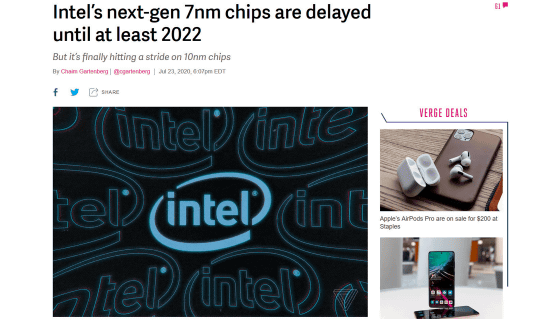About 1 year delay in Intel's 7 nm process development, CEO suggests that it is considering outsourcing chip manufacturing

by
In the second quarter 2020 (April-June) financial results announcement, major semiconductor maker Intel confirmed that there is a delay of about a year in developing the next-generation 7nm process. Along with this, Intel's CEO Bob Swan said 'I am considering outsourcing of chip manufacturing', so Intel's stock price fell by 16% on July 24, 2020 (Friday) doing.
Intel Q2 20_EarningsRelease-Q2-2020_Earnings-Release.pdf
(PDF file) https://s21.q4cdn.com/600692695/files/doc_financials/2020/q2/Q2-2020_Earnings-Release.pdf
Intel's next-gen 7nm chips are delayed until at least 2022-The Verge
https://www.theverge.com/circuitbreaker/2020/7/23/21336356/intel-7nm-chips-next-gen-delay-q2-2020-earnings-amd-10nm-tiger-lake-desktop-laptop- CPU

Intel's Q2
On the other hand, Intel also acknowledges that there is a delay in the development of the next-generation chip 7nm process, and the release of CPU products equipped with 7nm process chips will be delayed by 6 months from the previous forecast in 2022. It is said that it slips in. In fact, it seems that the development delay of the 7 nm process is not about 6 months, but there is a delay of 1 year compared to Intel's internal roadmap, but for some reason the delay of launching to the market will be about 6 months Intel I argue.
In connection with the 7nm process development delay, CEO Swan said, 'We may no longer be able to manufacture all the chips ourselves' and are considering outsourcing chip manufacturing. I admitted. Intel's stock price fell by 16% on Friday, July 24, following the remarks of CEO Swan, and it has fallen since the beginning of March 2020 due to the pandemic of COVID-19.

Bloomberg said Swan's statement marks the end of the regime in which Intel and the US dominate the semiconductor industry. He said the move would affect the world beyond Silicon Valley, potentially affecting trade and geopolitics.
Intel'Stunning Failure' Heralds End of Era for US Chip Sector-Bloomberg
Bloomberg commented that Intel has been the world's top chipmaker for the past 30 years, combining best-in-class designs with state-of-the-art factories. While other chipmakers closed or sold factories in the U.S., Intel has argued that it can produce excellent semiconductors by continuing design and in-house production, but the delay of 7 nm process production has made this strategy tattered. It is said that.
Mr. Swan says 'where to manufacture semiconductors is not a big issue', but admitting the failure of the roadmap will indicate 'the end of Intel's control of computing', investment bank Raymond • James Financial analyst Chris Caso points out. Also, some American politicians and national security experts believe that bringing technology for chip production out of the country is potentially dangerous.
Intel's Xeon chips are used in computers and data centers for the design of nuclear power plants, spacecraft and jets, as well as government agencies that handle a variety of information. At the time of writing, these processors are manufactured in Oregon, Arizona, and New Mexico, but TSMC may be a strong candidate when Intel outsources the chip. Since TSMC is headquartered in Taiwan, which is right next to China, there are concerns that outsourcing to TSMC poses geopolitical risks.
Intel has invested tens of billions of dollars (about several trillion yen) over the years to update the factory, but the situation has changed with the rise of smartphones and mobile devices. Although Intel also started manufacturing chips for smartphones, since it prioritized existing PC and server chips, smartphone makers have installed Qualcomm chips or chips designed in-house like Apple.
TSMC has undertaken the manufacturing of chips for smartphones of companies that do not have their own factory, so the difference in experience with Intel has expanded. At the time of writing the article, Intel manufactures hundreds of millions of chips annually, while TSMC manufactures more than 1 billion chips per year, TSMC has experience and engineer technology to improve the factory. Bloomberg points out that it has accumulated abundantly and has overtaken Intel.

Related Posts:
in Hardware, Posted by log1h_ik







